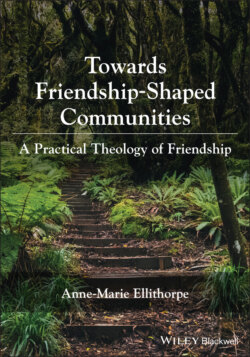Читать книгу Towards Friendship-Shaped Communities: A Practical Theology of Friendship - Anne-Marie Ellithorpe - Страница 23
1 The Place of Friendship
ОглавлениеWhat is friendship, and what place does it have in contemporary communities? This chapter considers ways in which friendship is currently defined, understood, and lived out. Key interrelated themes include the question of whether friendship is essential or peripheral to what it means to be human; friendship’s place in our social world; the impact of technology on contemporary relationships and communities; the possibility of theological, ethical, or spiritual dimensions to friendship; and whether friendship is a private, public, or political relationship. Writings that have influenced the theological and social imagination of pastors and lay people over recent decades are included alongside broader Euro-Western cultural trends, and insights from anthropologist and sociologists. Whether regarded as an endangered relationship or an important source of social glue, friendship emerges as playing an invaluable role within contemporary communities, including communities of faith.
What is friendship, and what place does it have in contemporary communities? Practical theologians begin by articulating the way things are, before reflecting critically on contemporary experience in the light of theological norms. Thus, it is appropriate to consider how friendship is currently defined, understood, and lived out, and the norms, metaphors, and visions that underlie actions and practices.
The meanings and practices associated with friendship vary. Friendship, it has been said, has a place within a continuum of interpersonal relationships, from intimacy to enmity, with friendship, friendliness, indifference, and unfriendliness in-between.1 Yet friendship can co-exist with intimacy and even, it seems, with enmity, given the existence of the term frenemies.
Friendship is an important yet under-researched relationship. Within various treatments of friendship several themes and questions arise. This chapter is structured around key interrelated themes including definitions of friendship, friendship’s relevance to what it means to be human, the place of friendship in our social world, the impact of technology on contemporary friendships and communities, theological, ethical, or spiritual dimensions to friendship, and whether friendship is a private, public, or political relationship.
Theological writings that have influenced the theological and social imagination of pastors and lay people over recent decades are included alongside broader cultural trends, works from the social sciences, and ethical, historical, and spiritual perspectives. This chapter focuses on the more recent past, while acknowledging that ancient understandings and ideals continue to influence contemporary understandings and ideals. Throughout the twentieth century, friendship has been variously regarded as a model for other relationships, disdained, valued from a primarily utilitarian perspective, and recognized as transformative. Controversy continues over the status of friendship in the early twenty-first century, and over the impact of new technologies on friendship.
I invite you, my readers, to consider the place of friendship in your own life and communities of practice. How would you define friendship? How has friendship been formative in your life, and contributed to the shaping of your identity and your life paths? Has friendship also been a source of pain, tension, or conflict? Is it messier and more lopsided than often portrayed? What impact have various forms of technology had on your friendships? Where have you experienced friendship contributing to community, and where has it detracted from community? What practices support the sustenance and growth of friendships? What questions do you have about friendship? The research presented in this chapter is primarily located within Western thought and culture, as is typical thus far for friendship studies. Are you immersed in non-Euro-Western understandings of friendship that may further challenge and enrich understandings and practices of friendship?
